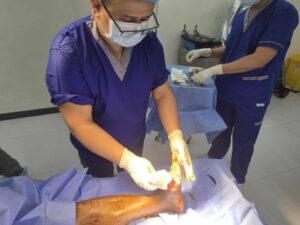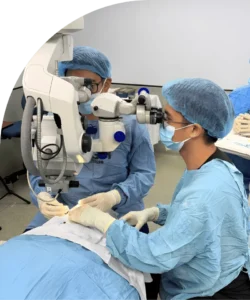Understanding the Role of a Specialist Doctor for Wounds
A specialist doctor for wounds focuses on diagnosing, treating, and preventing wounds that do not heal properly or require advanced care. Unlike general practitioners, these doctors undergo specific training in wound management, which combines knowledge of dermatology, vascular health, infection control, and even surgical techniques. Their expertise allows them to address wounds that would otherwise linger for weeks or months without improvement. These specialists work closely with patients who have complex conditions such as diabetes, poor circulation, or compromised immune systems. They use advanced tools to assess wound size, depth, and risk of infection. This level of attention ensures that each wound is treated with precision. For many patients, having access to a wound care expert means the difference between slow, painful recovery and a return to normal life.
When to Seek a Specialist Doctor for Wounds
Not every wound requires specialized medical attention, but knowing when to seek help can prevent serious complications. A patient should consider seeing a specialist if a wound shows no signs of healing after several weeks, becomes increasingly painful, or produces unusual drainage. Wounds that appear red, swollen, or have a foul odor may already be infected, which requires immediate care. Chronic wounds, such as those caused by diabetes or venous disease, almost always benefit from specialist intervention. Individuals who experience slow-healing wounds after surgery or trauma should also seek out a doctor trained in wound management. Waiting too long to consult a professional can lead to infections that spread to deeper tissues or even the bloodstream. By recognizing the warning signs early, patients can avoid unnecessary suffering and long-term damage.
Types of Wounds That Require Specialized Care
A specialist doctor for wounds treats a wide variety of injuries, many of which go beyond simple cuts and scrapes. Chronic wounds, such as diabetic ulcers, are particularly difficult to manage because they often reopen or fail to close properly. Venous ulcers, which are common in patients with poor circulation, require advanced treatment to prevent them from recurring. Pressure sores, also known as bedsores, are another common challenge, especially among bedridden or immobile individuals. Surgical wounds that fail to heal on schedule may also require expert evaluation. Traumatic injuries, severe burns, and wounds that become infected often benefit from advanced therapies only available from specialists. In elderly patients, even minor wounds can become complicated due to thinner skin and slower natural healing. These examples highlight the need for doctors who dedicate their careers to wound healing and management.
Advanced Treatments Offered by Wound Specialists
One of the key reasons patients seek a specialist doctor for wounds is access to advanced treatments. Unlike basic first-aid or general care, wound specialists use cutting-edge therapies to stimulate healing. For example, modern wound dressings include medicated foams, gels, and antimicrobial materials designed to keep the wound moist while reducing infection risk. Negative pressure wound therapy uses a vacuum device to promote blood flow and remove excess fluids. Hyperbaric oxygen therapy, another advanced method, delivers concentrated oxygen to help stubborn wounds repair faster. Some specialists also apply bioengineered tissues or growth factors to accelerate recovery. In certain cases, skin grafts are used to restore tissue integrity. Each treatment plan is customized based on the type of wound, the patient’s overall health, and the underlying causes preventing natural healing. These innovations make wound care specialists invaluable for patients with complex medical needs.
Benefits of Consulting a Specialist Doctor for Wounds
Choosing to see a wound care specialist offers numerous advantages that can significantly improve patient outcomes. One of the most important benefits is faster healing, as wounds that linger for weeks may finally close when treated with advanced methods. Reduced complications are another advantage, since specialists can prevent infections that often develop in untreated wounds. Patients also experience less pain when wounds are managed properly, thanks to specialized dressings and therapies that protect sensitive tissue. Beyond physical healing, wound specialists also support emotional well-being by giving patients confidence that their condition is being handled by an expert. For individuals with recurring wounds, a specialist can provide long-term strategies to prevent new injuries. Improved mobility, quality of life, and reduced hospital stays are additional benefits. These doctors not only heal wounds but also help patients regain independence and peace of mind.
What to Expect During a Visit with a Wound Care Specialist
A visit to a specialist doctor for wounds typically begins with a thorough assessment. The doctor will examine the wound closely, measuring its size, depth, and the condition of the surrounding skin. Diagnostic tools such as blood flow studies or lab tests may be used to understand why the wound is not healing. After this evaluation, a customized treatment plan is created, often combining multiple therapies for the best outcome. Patients can expect clear instructions on how to care for the wound at home, including cleaning methods and dressing changes. Education plays a major role in these visits, as patients and caregivers are taught to recognize early signs of infection or delayed healing. Wound specialists often work as part of a team with nurses, physical therapists, and dietitians to provide complete care. This collaborative approach ensures that every aspect of the patient’s healing journey is supported.
How Specialist Doctors for Wounds Support High-Risk Patients
High-risk patients often require specialized attention, and wound doctors are trained to meet these needs. For example, people with diabetes face constant challenges with ulcers on their feet due to nerve damage and poor circulation. Wound specialists not only treat these ulcers but also provide preventive strategies such as proper footwear and regular skin checks. Patients with vascular disease often develop leg ulcers that require careful monitoring and advanced therapies to heal. After surgery, some patients may face delayed healing or wound separation, which can be effectively managed with expert care. Bedridden patients, especially in nursing homes, are at risk for pressure ulcers that can become life-threatening if untreated. A wound care specialist helps prevent these wounds by recommending repositioning schedules, cushions, and support surfaces. By focusing on prevention and treatment, wound doctors play a critical role in protecting the health of vulnerable individuals.
Finding the Right Specialist Doctor for Wounds
Choosing the right wound care specialist can make a significant difference in recovery. Patients should start by considering whether the doctor is affiliated with a wound care center or hospital-based clinic, as these facilities often have access to advanced equipment. Private practices may also provide excellent care, especially if they focus solely on wound management. When searching for a specialist, it is helpful to ask about their experience treating conditions similar to yours. Patients should also inquire about available treatment options, including advanced therapies like hyperbaric oxygen or negative pressure systems. Referrals from primary care doctors can be valuable, but patients can also research online directories or hospital listings. Comfort and communication are important as well; a good wound specialist will take time to explain treatment plans and answer questions. By selecting the right professional, patients gain a trusted partner in their healing journey.
Frequently Asked Questions (FAQ)
What is the difference between a wound specialist and a regular doctor?
A regular doctor can treat minor injuries, but a specialist doctor for wounds has advanced training in managing complex, chronic, or non-healing wounds.
How long does it usually take for wounds to heal under specialist care?
Healing time varies depending on the type of wound and the patient’s health, but specialist treatments often speed up recovery compared to standard care.
Does insurance cover treatment from a wound care specialist?
Many insurance plans cover wound care services, though coverage depends on the provider, the type of wound, and the treatments required.
Are there home care options guided by a wound specialist?
Yes, specialists often provide detailed instructions for at-home wound care and may schedule regular follow-ups to monitor healing.
Can wound care specialists help prevent future wounds?
Absolutely. They not only treat current wounds but also educate patients on prevention strategies, such as managing chronic conditions and improving circulation.










